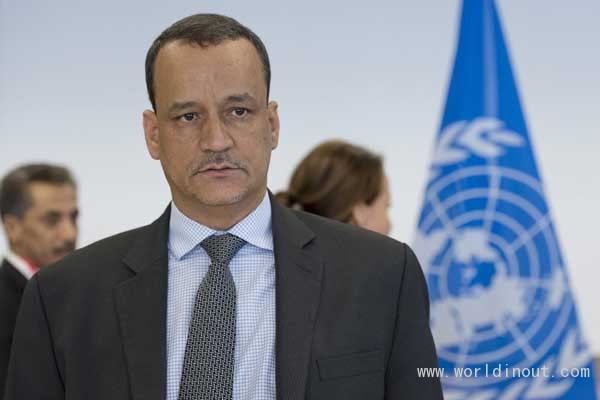
|
|
UN Secretary-General Special Envoy Ismail Ould Cheikh Ahmed opens with delegations from Sanaa at the Yemen peace talks in Switzerland December 15, 2015. |
A ceasefire took hold in Yemen on Tuesday as United Nations-sponsored peace talks opened in Switzerland in a new push to end months of fighting that has killed nearly 6,000 people and dragged in foreign powers, a UN spokesman said.
Army commanders and residents said the truce appeared to be largely holding despite some minor violations reported by both sides.
The United Nations said it was preparing to deliver medicine and food to Yemen this week, taking advantage of the seven-day ceasefire to address one of the world's worst humanitarian crises.
"It is you who will decide whether peace will prevail or Yemen will be thrust further into darkness, tragedy and suffering," UN Secretary-General Special Envoy Ismail Ould Cheikh Ahmed said in opening remarks to delegates in Geneva.
"Are you going to abandon Yemen and its people and lead the country into further violence and slaughter, or are you going to put Yemen first?" he said.
The war has pitted the Houthis, a northern-based, Shi'ite movement who seized the capital Sanaa and much of the rest of the country since September 2014, against the government of President Abd Rabbu Mansour Hadi.
A Saudi-led coalition, mainly comprised of Gulf Arab forces and aided by the United States, intervened in March with air strikes and ground troops and has rolled back some of the advances by the Houthis. Hadi fled to Saudi Arabia in February but returned to loyalist-held Yemen last month.

|
|
UN Secretary-General Special Envoy Ismail Ould Cheikh Ahmed (C) open with delegations from Sanaa at the Yemen peace talks in Switzerland December 15, 2015. |
Islamist militants are also involved in the conflict.
An earlier round of UN-backed indirect talks in Geneva in June ended without an agreement, with both sides blaming each other for their collapse. Unlike the previous round, the current session opened with an agenda being agreed and with senior delegates meeting face-to-face.
The main task for the negotiations will be agreeing on how to implement a UN Security Council Resolution in April that called on the Houthi movement to quit Sanaa and other cities.
Yemeni Prime Minister Khaled Bahah said in Qatar that the purpose of the talks was to win back the state seized by the Houthis. The option of using force to achieve that remained on the table, he said.
"Despite the optimism, and based on our experience, the talks won't be easy," Bahah said, according to the Qatari state news agency QNA.
"We are seeking to reach peaceful solutions but the stick will remain to achieve what could not be achieved in the talks."






